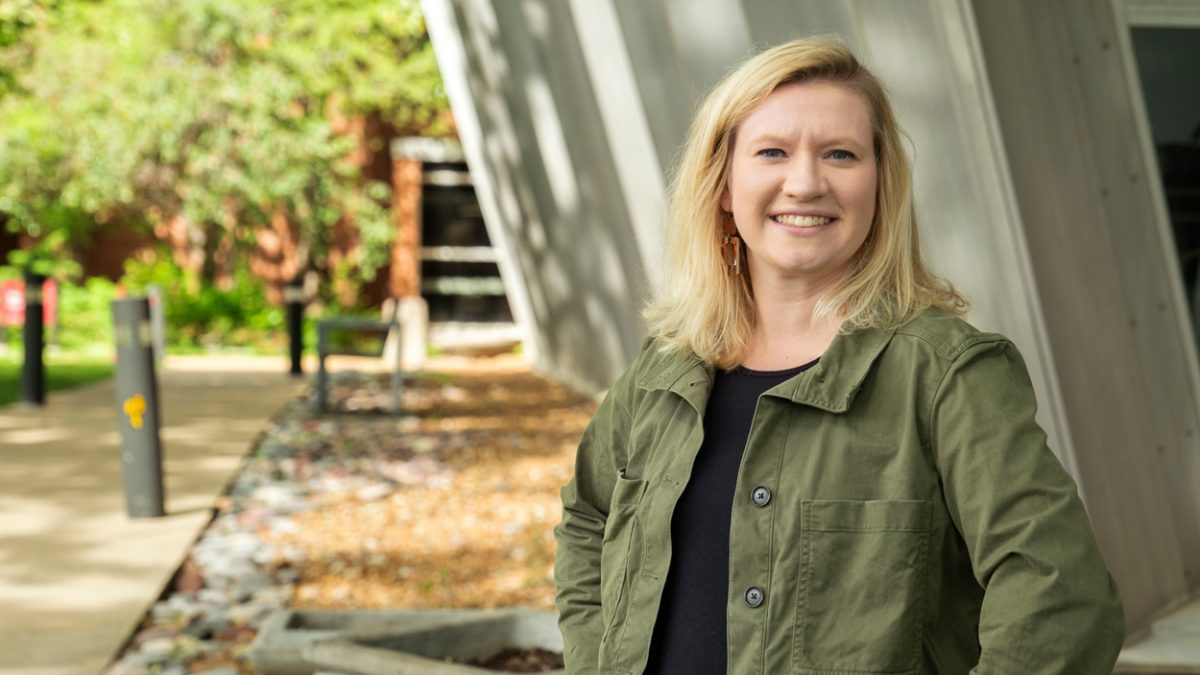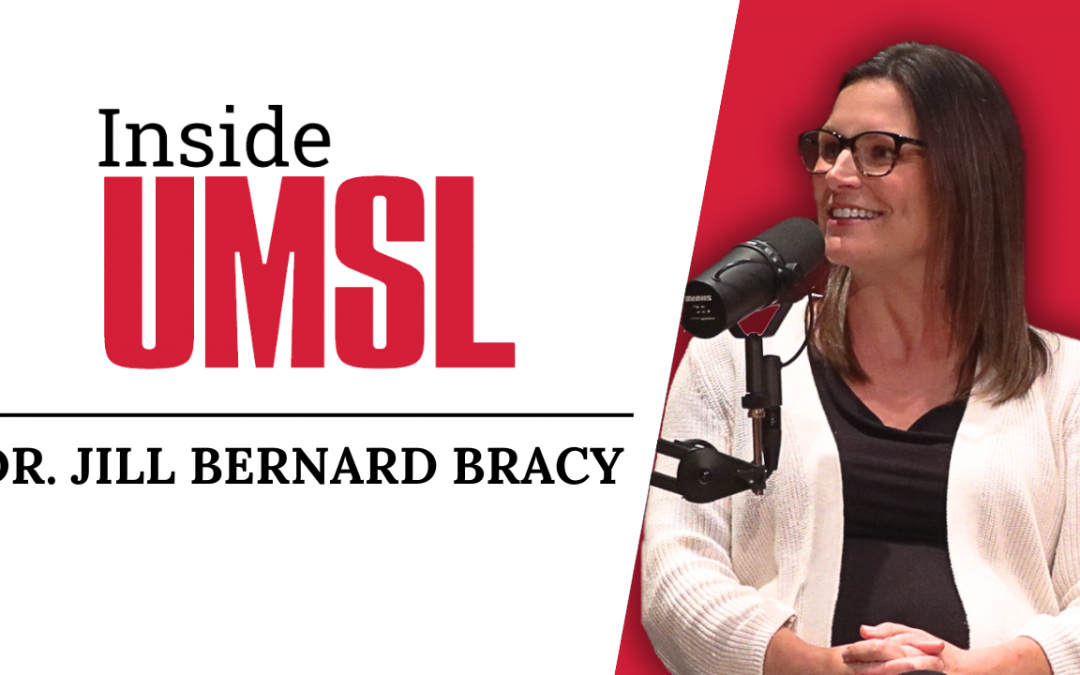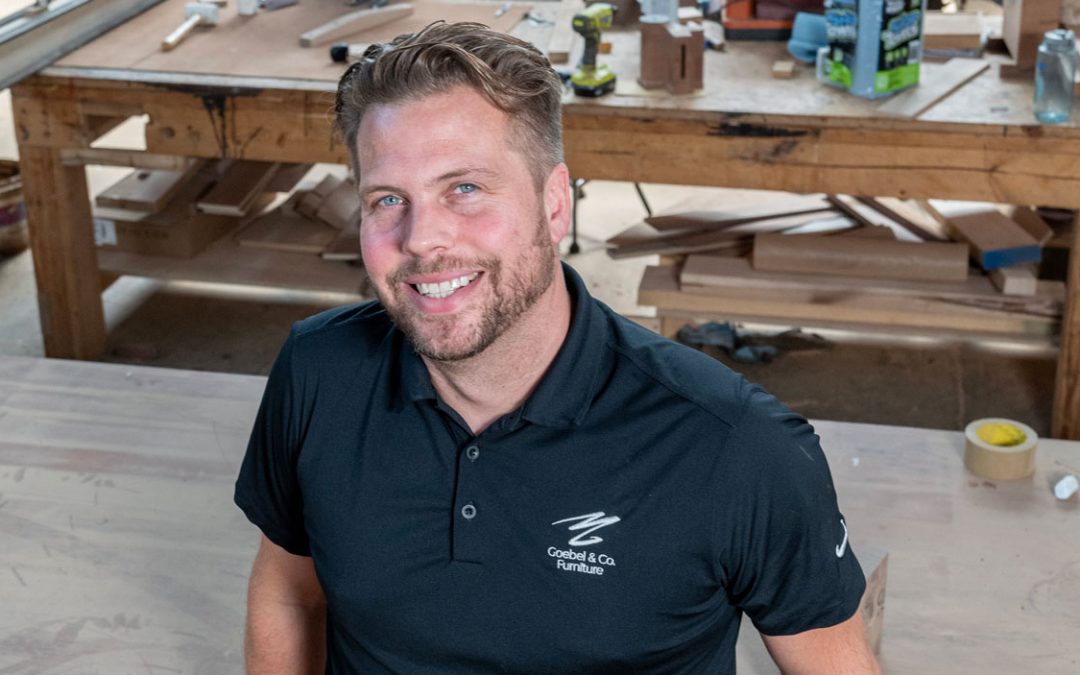
Gabrielle Sewester successfully defended her dissertation earlier this month, earning a doctorate in educational psychology from the College of Education. Sewester works as a juvenile officer with the Missouri Department of Social Services Children’s Division and hopes to apply her research in the field. (Photo by Derik Holtmann)
Even as a teenager, Gabrielle Sewester loved being around children and families. An avid athlete, she coached younger kids and also worked at youth summer camps.
Sewester thought her fondness for working with families would eventually translate to a career in nursing. In high school, she volunteered at Mercy Hospital St. Louis for one summer but found that she enjoyed interacting with the pediatric patients more than the clinical aspects of health care.
“One of the staff for the hospital recommended social work, and I had never really thought about it before,” she recalled.
The suggestion spurred Sewester to pursue a bachelor’s degree in child and family development and then a master’s degree in human development and family science at the University of Central Missouri. From there, she went on to a successful career in the Missouri Department of Social Services Children’s Division as an alternative care worker and juvenile officer, working with children and families in the foster care system.
Sewester has continued to advocate for foster care children while furthering her education at the University of Missouri–St. Louis. Earlier this month, she graduated from the College of Education with a PhD in educational psychology after successfully defending her dissertation on placement stability among foster care children.
“It felt amazing,” she said of defending her dissertation. “It was a huge accomplishment that I’ve been working for for four years. It felt good to be done.”
After graduating from UCM with her bachelor’s degree in 2015, Sewester began working at a domestic violence shelter. Through a client at the shelter, she met a Children’s Division worker and applied for a position with the organization.
Children’s Division is responsible for the administration of child welfare services in Missouri and works in partnership with families, communities and courts to ensure the safety and well-being of children in the state. Sewester started her career as an alternative care worker, supervising families in the field from the time children entered foster care due to credible allegations of abuse or neglect until they returned home, entered an adoption or guardianship or aged out of the system. In her current role as a juvenile officer, she still oversees cases but primarily works on the legal side of the system.
Sewester acknowledges that the work can be difficult at times, but it’s also incredibly rewarding.
“If you try to find the positives, if you try to make those connections with parents and caregivers, I’ve noticed that helps a lot because they’re willing to trust you,” she said. “If you can build that relationship so they’ll take the advice you give, they’re willing to talk to you about problems when they come up. It can be tough, but there’s a lot of good things that come from it – especially when you get to send the children back home with their parents and everyone’s really excited.”
A desire to build upon the positives in the foster care system was the impetus for her doctoral research at UMSL, though she first fell in love with the research process during her master’s program.
Sewester returned to UCM shortly after graduating to enroll in a new accelerated master’s program in human development and family science.
“I was like, ‘Well, I can do anything for a year. Let’s give it a shot,’” she said.
The program’s research courses immediately resonated with her, so much so that she sought permission to conduct an independent research project and write an accompanying thesis even though neither was required in the accelerated program.
After earning her MS, Sewester still felt like her work was unfinished. Her graduate school advisor encouraged her to continue her education, so she began looking for a doctoral program that would be flexible enough for her to continue working full-time at Children’s Division and also provide her with new skills.
UMSL’s educational psychology program fit the bill.
Sewester enjoyed the ability to pursue multidisciplinary coursework. She also praised the College of Education’s helpful faculty and staff, particularly her dissertation committee: Professor Cody Ding, Associate Professor Shea Kerkhoff, Associate Professor Emily Brown and Assistant Professor Kristy Brann.
“I had great professors,” Sewester said. “They all help lead you to where you want to go, even if they weren’t necessarily experts in what I was studying. They all suggested theories, research questions or ideas and helped along the way, which was amazing. It was a good experience. I met a lot of classmates that I still talk to now. We kind of helped push each other to finish our dissertations.”
Her dissertation, “Exploring Strategies for Placement Stability Among Foster Care Children,” stemmed from her experience working in the child welfare system. Some foster care children experience frequent placements, moves from home to home, which creates uncertainty in their lives and disrupts their cases. The qualitative study examined how some foster parents are able to provide stable environments for the duration of a case and what factors are involved.
“Gabrielle used an asset-based approach to her research, which shines a light on the positive experiences of foster parents,” Kerkhoff said. “Highlighting their experiences will be a great resource for future foster parents, hopefully resulting in more stability for all children.”
Sewester interviewed 13 foster parents from across Missouri who reported at least one placement they deemed successful. The hourlong interviews, conducted via Zoom, touched on a variety of topics including their motivations for becoming foster parents, responses to difficulties, interactions with caseworkers, experiences at court hearings and more.
Over the course of the project, three themes emerged. The first, and most important, was a child-focused approach to the placement.
“Most of the successful placements happened when the placement providers focused on the children and whether they were safe and if they got the access to services that they needed,” Sewester said, “and if that child had the ability to grow and learn and be themselves when they were placed with them.”
The second key aspect was an understanding of the children’s past trauma and how that can affect behavior, while the final component was a connection to and engagement with the foster care community. Parents often felt more confident with a support system around them where they could share experiences and resources.
“When I read Gabrielle’s findings for the first time, I cried because I knew that her research was going to help people,” Kerkhoff said.
Sewester said she just wanted to change the narrative around foster care and highlight the people working hard to make sure kids are safe. Ultimately, she hopes the conditions she identified can be replicated in more homes and inspire broader change.
“This research really does focus on the positives and the successes, and it’s not talked about enough,” she said. “I think if we changed the focus, then it might be a switch that the child welfare system needs in order to have more success stories.”














